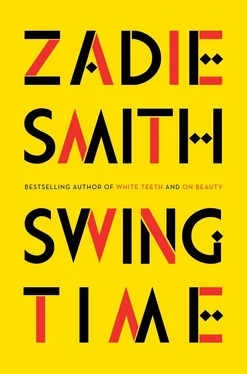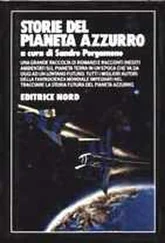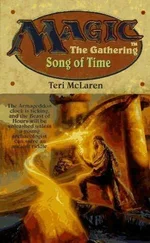Zadie Smith - Swing Time
Здесь есть возможность читать онлайн «Zadie Smith - Swing Time» весь текст электронной книги совершенно бесплатно (целиком полную версию без сокращений). В некоторых случаях можно слушать аудио, скачать через торрент в формате fb2 и присутствует краткое содержание. Город: NYC, Год выпуска: 2016, ISBN: 2016, Издательство: Penguin Publishing Group, Жанр: Современная проза, на английском языке. Описание произведения, (предисловие) а так же отзывы посетителей доступны на портале библиотеки ЛибКат.
- Название:Swing Time
- Автор:
- Издательство:Penguin Publishing Group
- Жанр:
- Год:2016
- Город:NYC
- ISBN:978-0-39956-431-4
- Рейтинг книги:4 / 5. Голосов: 1
-
Избранное:Добавить в избранное
- Отзывы:
-
Ваша оценка:
- 80
- 1
- 2
- 3
- 4
- 5
Swing Time: краткое содержание, описание и аннотация
Предлагаем к чтению аннотацию, описание, краткое содержание или предисловие (зависит от того, что написал сам автор книги «Swing Time»). Если вы не нашли необходимую информацию о книге — напишите в комментариях, мы постараемся отыскать её.
Dazzlingly energetic and deeply human,
is a story about friendship and music and stubborn roots, about how we are shaped by these things and how we can survive them. Moving from northwest London to West Africa, it is an exuberant dance to the music of time.
Swing Time — читать онлайн бесплатно полную книгу (весь текст) целиком
Ниже представлен текст книги, разбитый по страницам. Система сохранения места последней прочитанной страницы, позволяет с удобством читать онлайн бесплатно книгу «Swing Time», без необходимости каждый раз заново искать на чём Вы остановились. Поставьте закладку, и сможете в любой момент перейти на страницу, на которой закончили чтение.
Интервал:
Закладка:
But a few days later I saw Louie, in a completely different context, it was in Kentish Town. I was on a bus, on the top deck, I spotted him in the street, with his arm around a very pregnant woman, the kind we used to call a “home girl,” with big gold earrings in the shape of pyramids, wearing a lot of chains and with her hair greased and frozen in a pattern of kiss-curls and spikes. They were laughing and joking together, and kissing every now and then. She was pushing a buggy with a child in it, of about two years old, and holding the hand of a seven- or eight-year-old. My first thought was not “Who are these children?” But: “What’s Louie doing in Kentish Town? Why’s he walking down Kentish Town High Street like he lives there?” I really couldn’t think beyond a one-mile radius. Only when they were out of sight did I consider all the occasions Tracey had lied or bluffed about his absence — she stopped crying about it when she was very young — without ever guessing how close by he likely was the whole time. Not at the school concert or the birthday or the show or the sports day or even simply in the house, for dinner, because he was tending, supposedly, to an eternally sick mother in south Kilburn, or dancing with Michael Jackson, or thousands of miles away in Jamaica, building Tracey’s dream home. But that one-sided conversation on the grassy verge had confirmed for me that we could no longer speak of intimate things. Instead, when I got home, I told my mother what I’d seen. She was in the middle of trying to cook dinner, always a stressful moment of the day, and she became annoyed with me, with a speed and heat out of all proportion. I couldn’t understand it, I knew she hated Louie — so why defend him? Slamming pots about, speaking passionately of Jamaica, and not present-day Jamaica but Jamaica in the 1800s, the 1700s, and beyond — present-day Kentish Town was pushed aside as an irrelevance — telling me about breeders and bucks, of children torn from their mother’s arms, of repetition and return, through the centuries, and the many missing men in her bloodline, including her own father, all of them ghost men, never seen close up or clearly. I drew back from her as she ranted, until I was pressed up against the warmth of the oven door. I didn’t know what to do with all the sadness. A hundred and fifty years! Do you have any idea how long a hundred and fifty years is in the family of man? She clicked her fingers, and I thought of Miss Isabel, counting children in for the beats of a dance. That long, she said.
A week later somebody set a fire in the old bike shed, the night before I was due to speak, reducing it to a black box of carbon. We toured it with the firemen. It smelled terribly of all the plastic chairs that had been piled up against the walls and were now melted and melded together. I was relieved, it felt like an act of God, although all signs pointed closer to home, and soon enough Louie’s boys reclaimed their space. The day after the fire, when my mother and I were out and about together, a few well-meaning people crossed the street to offer their sympathies or try to engage her on the subject, but she pursed her lips and stared at them as if they had said something coarse or personal. Brute force outraged her, I think, because it was outside her beloved realm of language, and in response to it she really had nothing to say. Despite her revolutionary stylings I don’t think my mother would have been very useful in a real revolution, not once the talking and the meetings were over and the actual violence began. There was a sense in which she couldn’t quite believe in violence, as if it were, in her view, too stupid to be real. I knew — from Lambert only — that her own childhood had been full of violence, emotional and physical, but she rarely referred to it other than calling it “that nonsense,” or sometimes “those ridiculous people,” because when she ascended to the life of the mind everything that was not the life of the mind stopped existing for her. Louie as a sociological phenomenon or a political symptom or a historical example or simply a person raised in the same grinding rural poverty she’d known herself — a person whom she recognized, and I believe intimately understood— that Louie my mother could deal with. But the look of utter forsakenness on her face as the firemen led her to a far corner of the shed to show her the spot where the fire had been started, by someone she knew personally, had tried to reason with, but who, despite this, had chosen to violently destroy what she’d lovingly created — this look is something I’ve never forgotten. Louie did not even need to do it personally, and equally did not have to hide that he had ordered it done. On the contrary he wanted it known: it was a show of power. At first I thought this fire had destroyed something essential in my mother. But a few weeks later she regrouped, convincing the vicar to let her move her community meetings to the back room of the church. The incident even turned out to be useful, in a way, for her campaign: it was the visual, literal confirmation of the “urban nihilism” of which she had often spoken and partly built her campaign around. Not long after, she became our local councilor. And here the second act of her life, the political act — which I’m sure she considered the true act of her life — began.
The build finished with the rainy season, in October. To celebrate, an event was planned in the new yard, half a football pitch of cleared ground. We weren’t involved in the planning — the village action committee did that — and Aimee didn’t arrive till the morning of the same day. But I’d been on the ground for a fortnight, and had grown worried about the logistics, the sound system, the size of the crowd, and the conviction, shared by everybody — children and adults, the Al Kalo, Lamin, Hawa, all her friends — that the President himself was going to make an appearance. The source of this rumor was hard to determine. Everybody had heard it from someone else, it wasn’t possible to get any further information, only winks and smiles, as the assumption was that we, “the Americans,” were behind the visit anyway. “You ask me if he is coming?” said Hawa, laughing, “but don’t you know yourself?” The rumor and the scale of the event quickly fed upon each other: first three local nursery schools would participate in the parade, then five, then fifteen. First it was the President coming, then also the leaders of Senegal, Togo and Benin, and so to the mothers’ drumming circle were added half a dozen griots playing their long-necked kora and a police marching band. We started to hear that communities from several other villages were being bussed in and that a famous Senegalese DJ would play after the formal events. Running underneath all this noisy planning there was something else, a low rumble of suspicion and resentment, which I couldn’t hear at first but which Fernando recognized at once. For no one knew exactly how much money Aimee’s people had wired to the bank in Serrekunda, and so no one could be sure how much Lamin personally had received, nor was anybody able to say precisely how much of that money he had placed in the envelope which later arrived at the Al Kalo’s house, and how much he had left at that house with Fatu, our Lady Treasurer, before the remainder finally landed in the coffers of the village committee itself. No one accused anybody, not directly. But all conversations, no matter where they began, seemed to end up circling the question, usually coiled up inside proverb-like constructions such as “It is a long way from Serrekunda to here” or “This pair of hands, then this pair, then another. So many hands! Who will keep clean what so many hands have touched?” Fern — as I also called him now — was disgusted by the general ineptitude: he’d never worked with such idiots as these idiots in New York, they made only problems and had no conception of procedure or local realities. He too became a proverb-producing machine: “In a flood the water goes everywhere, you don’t have to think about it. In a drought, if you want water, you have to direct it carefully along each inch of its path.” But his obsessive worrying, what he called “detail-orientation,” didn’t annoy me any more: I made too many mistakes, every day, not to understand by now that he knew better. It was not possible any longer to ignore the real difference between us, which went far beyond his superior education, his Ph.D., or even his professional experience. It was about a quality of attention. He listened and noticed. He was more open. Whenever I spotted him in my reluctant daily walk around the village — something I did purely for exercise and to escape the claustrophobia of Hawa’s compound — Fern would be locked in intense discussion with men and women of every age and circumstance, crouching by them as they ate, jogging next to donkey-drawn carts, sitting drinking ataya with the old men by the market stalls, and always listening, learning, asking for more detail, assuming nothing until he was told it. I compared all of this to my own way of being. Keeping to my dank room as much as possible, talking to no one if I could help it, reading books about the region by the light of a headtorch, and feeling a homicidal fury, adolescent in nature, toward the IMF and the World Bank, the Dutch who’d bought the slaves, the local chiefs who’d sold them, and many other distant mental abstractions to which I could do no practical damage.
Читать дальшеИнтервал:
Закладка:
Похожие книги на «Swing Time»
Представляем Вашему вниманию похожие книги на «Swing Time» списком для выбора. Мы отобрали схожую по названию и смыслу литературу в надежде предоставить читателям больше вариантов отыскать новые, интересные, ещё непрочитанные произведения.
Обсуждение, отзывы о книге «Swing Time» и просто собственные мнения читателей. Оставьте ваши комментарии, напишите, что Вы думаете о произведении, его смысле или главных героях. Укажите что конкретно понравилось, а что нет, и почему Вы так считаете.












